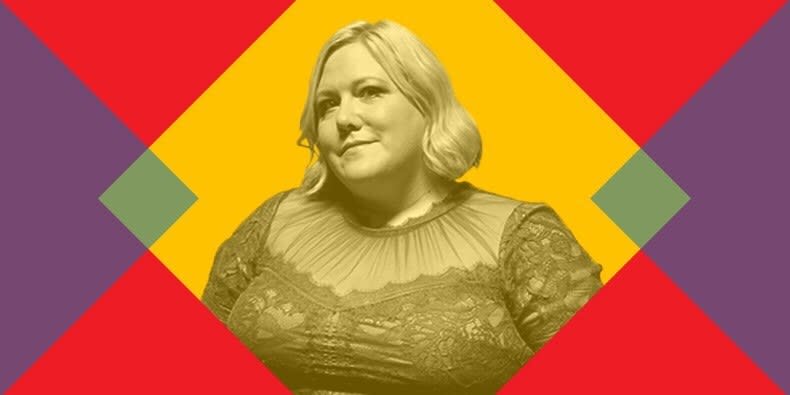What Shrill Writer Lindy West Is Listening to Right Now

Lindy West has been immersed in music her entire life. Her father, Paul West, was a lounge-y pianist around Seattle. She sang in choir and played multiple instruments growing up. She married a jazz musician, the experimental trumpeter and comedian Ahamefule J. Oluo. But the Seattle-based writer remains steadfast in the belief that her musical taste has always been uncool. “I think the band that I’ve seen live the most times is Tenacious D,” she admits not long after we get on the phone one recent afternoon.
This is not exactly the musical vibe of “Shrill,” the new Hulu dramedy adapted from West’s brilliant memoir of the same name. Angel Olsen has two songs in the six-episode first season, and “Voice of a Generation,” by the Oi! band Blitz, plays as a cheeky wink while the protagonist’s ex-punk boss throws a tantrum about not being The Man. “If anyone had a hand in steering the music, it was Aidy [Bryant],” says West of the show’s lead, who plays Portland alt-weekly journalist Annie Easton. “She has a really clear vision about everything.”
Watching “Shrill” is a bit disorienting if you’ve followed West’s career, which took her from blogging about film and fat acceptance at The Stranger to writing high-profile columns for the New York Times and The Guardian. Annie is like Lindy but also isn’t. For one, even though West is a writer on the series, there’s no great way to take personal essays about specific life events and create entire characters out of them. What the two share, most crucially, is the sense that they are fat everywomen navigating the bumpy but thrilling waters of self acceptance. And for once, thank god, that role doesn’t include being the “sassy,” forever-single sidekick.
Ahead of the “Shrill” premiere on March 15, West—who served as an executive producer—called us up to discuss what’s been on her stereo of late.
Wilson Phillips: “Hold On” (1990)
I listen to this song all the time because it’s a true classic. But I’ve also been thinking a lot about the fat women I saw in media growing up, and the video for this song had a huge impact on me as a kid. What happens is, there are three women, and two of the women are conventionally beautiful and of course they’re wearing sexy negligees. And then there’s Carnie [Wilson], who is bigger. She’s way smaller than I am, but her size reads as fat in the context of television. They’re at the beach, five feet from the ocean, and Carnie’s wearing a fucking zoot suit!
People made fun of Carnie all the time, but she got to be part of a glamorous pop group. Her existence was a big deal to me. And as I was listening to the song recently, I thought: If “Shrill” had come out before that video was made, maybe Carnie could have worn a bikini to the beach. That moment made me feel like, hopefully, this show will make a little bit of a difference for the Carnies of the future.
While we’re on the topic of clearing a public path for big girls, I have to know: What do you think of Lizzo?
I’m obviously obsessed, to the point where I’m like, “Can she act? Will she be on the show?” She’s using her body in such a powerful way, presenting herself as the sexiest person on earth not despite her body but because of it. Beth Ditto [from Gossip] did a version of that, but Lizzo’s doing it with such joy and such defiance. And it’s really working! People are like, “Yeah, Lizzo is the sexiest person I’ve ever seen.”
Hiroshi Yoshimura: Music for Nine Post Cards (1982)
If I ever listen to anything highbrow, it’s because of my husband, who pays attention to everything. He got really into this album [when it was reissued in 2017] and started listening to it constantly. Then I started playing it because I’m working on a new book, and it’s the perfect thing to listen to while writing. When you’re nearing deadline and you feel like death is coming for you, this is just incredibly soothing to your brain. But I’ve got to say, it’s also as close to pop music as ambient music gets. It doesn’t waste any time or any notes, it’s extremely efficient and well-crafted. As a person in the process of crafting a book, that’s really inspiring.
Tracy Chapman: “Talkin’ Bout a Revolution” (1988)
What’s happening with R. Kelly and Michael Jackson is making me want to only listen to female singer-songwriters from the ’90s. I want to get far away from men. I want to go back in time and reminisce about high school, which maybe has something to do with watching “PEN15” as well. Also, I keep listening to songs about resistance and revolution from previous decades that, maybe at the time, I didn’t understand.
There’s something so heartbreaking about warnings we ignored, like Tracy Chapman saying poor people are going to rise up. But there’s also something pure about hope from 20 years ago that I just want to tap into. It was stigmatized to be sincere in the ’90s. You were supposed to be marinated in irony and detachment. I didn’t know how to absorb messages like this then. And now, all I want is sincerity.
Watch “Shrill” now on Hulu. (When you subscribe through links on our site, Pitchfork may earn an affiliate commission.)

